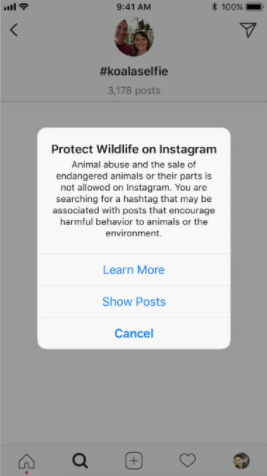If you’re thinking of posting that pic of you riding an elephant during your vacation in Thailand on social media, you may want to reconsider.
As of Monday, whenever an Instagram user searches for or clicks on a hashtag that is commonly connected to abusive behavior toward animals, including posing with and holding wild animals, the following warning message will pop up:
You are searching for a hashtag that may be associated with posts that encourage harmful behavior to animals or the environment.
Related Searches
Wild AnimalAnimal Selfie ImagesWild Animal ParkInstagram Search UsersThe Wild Animal Sanctuary
Users who click through to “learn more” are directed to a page on wildlife exploitation, with information warning tourists against taking photos with exotic animals.
“We encourage you to be mindful of your interactions with wild animals, and consider whether an animal has been smuggled, poached or abused for the sake of tourism,” Instagram’s page reads. “Be wary when paying for photo opportunities with exotic animals, as these photos and videos may put endangered animals at risk.”
The social media platform worked with several wildlife organizations ― the World Wide Fund for Nature, TRAFFIC, and World Animal Protection ― to identify the most commonly used hashtags associated with abusive behavior toward animals, including animal tourism and the wildlife trade.
Now hundreds of hashtag combinations will trigger the warning, an Instagram rep told HuffPost, ranging from phrases that tend to be used on photos of tourists with captive animals, such as #lionselfie, to more nefarious ones connected to illegal animal trafficking, like #exoticanimalforsale.

(Instagram)
Just a cursory search of the hashtag #lionselfie on Instagram turns up thousands of photos, many of which include people touching the wild cats or posing next to animals being held in captivity.
While most people know that trafficking endangered animals and selling their parts is illegal and harmful to the creatures involved, not everyone considers photos of someone holding a cute monkey or riding an elephant as endangering an animal’s well-being ― but they often can be.
“Many of the animals who tourists take photos with are stolen from their natural habitats. They are kept in cramped conditions and passed around from tourist to tourist, causing extreme stress,” animal rights group World Animal Protection writes on its website. “Animals may look happy in selfies. But they’ve often been taken illegally from their natural home and repeatedly baited with food. All this excessive human contact causes extreme trauma.”
Some indicators of whether an animal may be being abused include an animal being held, restrained or kept captive for tourists. It’s also not a good sign if the animal is away from its natural habitat or is not a safe distance from humans.

41 likes 4 comments
Bali, Indonesia. The elephant ride, felt sorry for the elephant. My first and last ride on an elephant. So much cruelty to elephant and especially in these foreign countries where the elephants are geared towards attracting tourist as a means of an income. . . Photo Credits: Unescotravelers Photography @unescotravelers . . #travel #bali #Indonesia #mountain #unesco #travelblogger #travelphotography #elephants #travelersnotebook #photography #natgeo #photographylovers #photooftheday #travelislife #travelingtheworld #skyview #travelerschoice #nationalgeography #traveltheworld #blueskies #cold #travellingthroughtheworld #skyline #architecturephotography #champhage #science #followme #comealong #romantic #elephantride
7 DAYS AGO
Instagram already had a policy in place that disallowed images showing animal abuse or the sale of endangered animals. Now the staff behind the app’s reporting and monitoring system have also gotten further education, with the help of wildlife experts, on what types of activities are abusive or illegal when it comes to animals, a company rep told HuffPost.
Instagram’s warning around wildlife exploitation functions much like those the platform set up last year related to issues of self-harm, which prompted a pop-up message to users searching hashtags related to suicide, eating disorders and other topics.
The platform’s warning system has its limits, however. While a message pops up after clicking on a given hashtag related to wildlife photos or sales, it won’t show up to warn a user if they’re the one posting a photo with the hashtag.
What’s more, anyone who sees the warning can simply choose to click through to “show posts” anyway and go about their search for #lionselfies.
The goal of the program is less about preventing people from posting or searching photos than about educating users about harmful behavior, an Instagram rep told HuffPost. It aims to teach people who might not otherwise know that their actions can encourage activities in the tourism industry that are harmful to animals.
Hi! I am a robot. I just upvoted you! I found similar content that readers might be interested in:
https://www.huffingtonpost.com/entry/instagram-wild-animal-selfies_us_5a25ca66e4b07324e83ffd5b